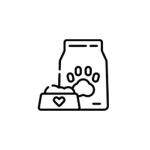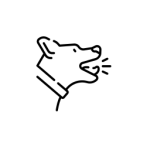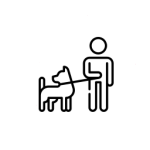Puppy Care: Everything You Need to Know About Raising a Happy from Day One
Table of Contents
Introduction
Bringing a puppy into your life is a moment of pure joy — and a big responsibility.
Puppies are curious, playful, and full of potential. With the right care, attention, and love, you can set the stage for a lifetime of health, happiness, and companionship.
This article will guide you through everything you need to know to confidently raise your puppy from day one, with tips that adapt to the changing seasons and practical advice you can trust.
Preparing for Your Puppy’s Arrival
Before your puppy even steps paw into your home, preparation is key to a smooth transition.
Checklist Essentials:
- Safe Space: Create a cozy, quiet area with a crate or soft bed.
- Puppy Supplies: Food and water bowls, high-quality puppy food, toys, a collar, leash, ID tag, and grooming tools.
- Puppy-Proofing: Remove small objects, secure wires, and block off unsafe areas.
First Few Days Tip:
Keep the environment calm. Too many visitors or loud noises can overwhelm a new puppy. Allow time for gentle exploration.
Example:
Anna brought home her Golden Retriever, Milo, and set up a small playpen with toys and a cozy blanket. By giving Milo a “safe zone,” he settled in much faster and felt secure from the start.
Essential Puppy Health Care
Keeping your puppy healthy starts immediately.
- First Vet Visit:
Within the first few days, schedule a check-up for vaccinations, deworming, and general health evaluation. - Vaccinations:
Core vaccines protect against diseases like parvovirus, distemper, and rabies. Follow the vaccination schedule recommended by your vet. - Parasite Prevention:
Puppies are vulnerable to fleas, ticks, and worms. Discuss preventive treatments early. - Microchipping:
A simple, permanent form of identification that greatly increases the chance of reuniting if lost.
Tip:
Start handling your puppy’s paws, ears, and mouth early — it makes vet visits and grooming much easier later on.
Building a Strong Training Foundation
Training starts on day one — yes, even tiny puppies can learn!
Key Early Lessons:
- House Training:
Take your puppy outside frequently (after meals, naps, play) and reward immediately for doing business outside. - Socialization:
Expose your puppy to different people, sights, sounds, and safe experiences between 8 and 16 weeks — a critical window for shaping confidence. - Basic Commands:
Teach “Sit,” “Come,” and “Leave it” with positive reinforcement (treats, praise, play).
Anecdote:
Mark adopted a shy Beagle named Daisy. By bringing Daisy gently to new places like quiet parks and rewarding her for calm behavior, Mark helped her grow into a confident adult dog.
Nutrition: Feeding Your Growing Puppy
Puppies have specific nutritional needs to support rapid growth.
Feeding Guidelines:
- Choose a high-quality puppy formula approved by veterinary nutritionists.
- Follow the recommended portion sizes based on your puppy’s weight and age.
- Feed three to four small meals a day until around six months of age.
Important:
Avoid overfeeding, which can cause joint issues in large breeds.
Fresh water should always be available.
Tip:
Use part of your puppy’s meal as training treats — this keeps sessions positive without adding too many extra calories.
Seasonal Puppy Care Tips
Each season brings new experiences (and challenges!) for your puppy:
Spring: Exploring the Outdoors
- Start Outdoor Socialization: Parks, safe puppy classes, and short walks introduce your pup to the world.
- Watch for Allergens: Pollen can cause sneezing or itchy paws. Wipe paws after walks.
Summer: Fun but Stay Cool
- Avoid Overheating: Train in the early morning or evening. Provide shade and access to fresh water.
- Water Play: Paddling pools and gentle sprinklers can be wonderful enrichment activities.
Fall: Learning in Comfort
- Longer Walks: Cooler weather is perfect for teaching leash manners.
- Fall Hazards: Watch for mushrooms, toxic plants, and piles of leaves hiding sharp objects.
Winter: Stay Warm and Safe
- Short Walks: Protect small breeds or short-haired puppies with a sweater if necessary.
- Indoor Training: Teach fun tricks like “paw,” “roll over,” or “find the treat” during bad weather days.
Seasonal Reminder:
Always check paws after walks — salt and ice can irritate sensitive puppy pads.
Real-Life Success Stories
Anecdote 1: Early Socialization Wins
Sophie adopted a Border Collie named Jack. She introduced Jack to a wide range of people, dogs, and new environments during his early months.
As a result, Jack became an incredibly adaptable dog — comfortable in cities, parks, and even crowded events.
Anecdote 2: Training During the Seasons
When winter hit, Alex worried that his puppy, Luna, would miss out on training. Instead, he taught Luna indoor games like “find it” and started nose work challenges.
Today, Luna is not just obedient but also an ace at scent detection games!
Conclusion
Raising a puppy isn’t always easy — it requires patience, consistency, and a lot of love.
But the rewards are beyond measure: a loyal, happy companion who trusts you deeply and brings joy every day.
By focusing on essential health care, building a positive training foundation, feeding a proper diet, and adjusting care with the seasons, you’re giving your puppy everything they need to grow into a confident, healthy dog.
Enjoy every moment of the puppy stage — it flies by faster than you think.
Your puppy isn’t just learning how to live in your world — you’re creating the memories and habits that will shape a lifetime together. 🐾







